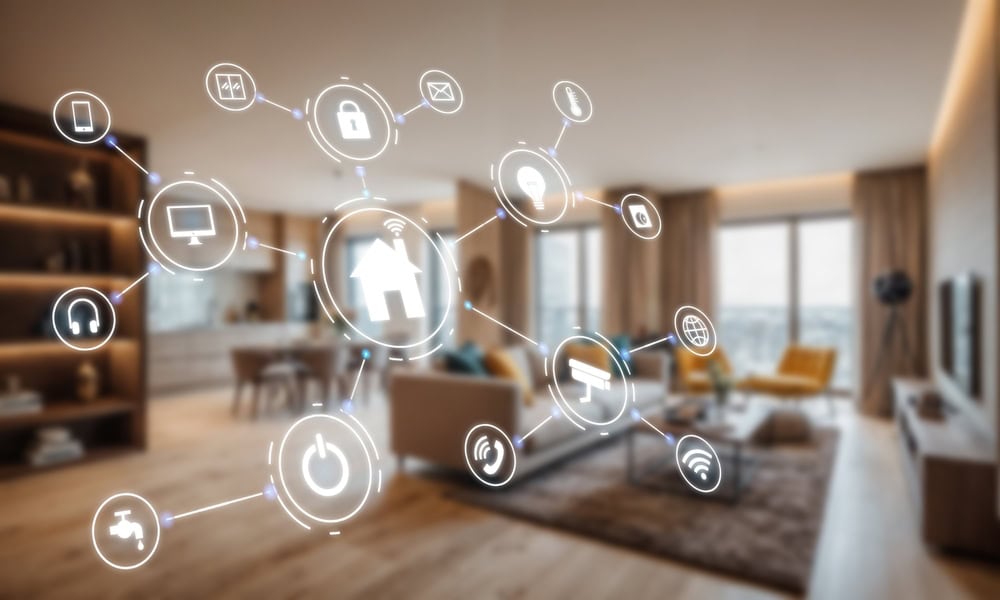The smart home industry has reached an inflection point in 2025, blending cutting-edge technology with practical applications that homeowners demand. For contractors in California, particularly small to medium-sized business owners, understanding these advancements is no longer optional—it’s essential for staying competitive. Whether you’re a general contractor, custom home builder, or remodeler, the integration of smart home technologies into your projects can elevate your offerings and attract tech-savvy clients. Here’s what you need to know about the future of smart homes and how managed IT solutions can play a pivotal role in your success.
A New Era of Smart Home Integration
In 2025, smart homes are no longer a luxury—they’re an expectation. Homeowners want seamless control over lighting, security, climate, and entertainment systems. The introduction of the Matter protocol has revolutionized device interoperability, enabling products from different manufacturers to work together effortlessly. This means fewer headaches for contractors and homeowners alike when integrating multiple systems into one cohesive ecosystem.
For example, consider a client who wants their HVAC system to adjust automatically based on room occupancy or their lighting to sync with natural daylight cycles. These are no longer futuristic ideas but standard requests. As a contractor, partnering with managed IT providers who specialize in smart home technologies can ensure these systems are installed correctly and function as intended.
Actionable Tip: Collaborate with IT service providers to offer post-installation support. Many homeowners struggle with troubleshooting smart devices, and offering a managed service package can set your business apart.
AI-Powered Homes: The Game-Changer
Artificial Intelligence (AI) is reshaping how homes operate. From predictive automation that learns user habits to AI-driven security systems with facial recognition, the technology is becoming more intuitive and personalized. For instance, AI-powered thermostats like Nest or Ecobee optimize energy usage by analyzing patterns in real-time. Similarly, security cameras equipped with AI can differentiate between a delivery driver and a potential intruder, reducing false alarms.
For contractors, this means designing spaces that accommodate these advanced systems. Electrical layouts must now include provisions for additional power outlets and robust Wi-Fi networks to support AI-enabled devices. Moreover, AI’s integration into construction tools—like delay forecasting software—can streamline project management and reduce costs.
Practical Example: A recent project in Southern California incorporated AI-driven lighting that adjusted color temperature throughout the day to mimic natural light patterns. This not only enhanced the home’s ambiance but also improved the occupants’ well-being.
Sustainability Meets Technology
Sustainability is no longer just a buzzword; it’s a core requirement for many homeowners. Smart homes are increasingly incorporating eco-friendly technologies like solar panels, energy-efficient insulation, and smart grids that optimize power usage. Contractors who embrace these trends can tap into a growing market of environmentally conscious clients.
For example, smart windows with electrochromic glass can adjust transparency based on sunlight exposure, reducing cooling costs during hot California summers. Similarly, integrating IoT-enabled water management systems can help homeowners monitor usage and detect leaks before they escalate into costly repairs.
Actionable Tip: Highlight the long-term cost savings of sustainable smart home features during consultations. Many homeowners are willing to invest upfront if they see clear financial benefits down the line.
Looking Ahead: What’s Next?
The global smart home market is projected to exceed $200 billion by the end of 2025. As this industry grows, so do homeowner expectations. Contractors who stay ahead of trends—like health-focused innovations (e.g., air quality monitors) or luxury features (e.g., voice-activated faucets)—will find themselves at the forefront of this lucrative market.
Moreover, California’s unique regulatory environment emphasizes sustainability and energy efficiency, making it imperative for contractors to align their offerings with state mandates. Managed IT solutions will continue to play a critical role in helping contractors navigate these complexities while delivering cutting-edge results.
Conclusion
The future of smart homes is here—and it’s smarter than ever. For contractors in California looking to thrive in 2025 and beyond, embracing this technology is not just an opportunity but a necessity. By understanding trends like AI integration, sustainability-focused designs, and the importance of managed IT solutions, you can position your business as an industry leader.
Start by building partnerships with local managed IT providers who understand the unique challenges of integrating advanced technologies into residential projects. Offer clients not just construction expertise but also tech-savvy solutions that enhance their living experience. In doing so, you’ll not only meet but exceed expectations—cementing your reputation as a forward-thinking contractor ready for the future of smart homes.

